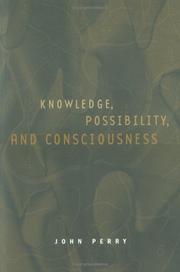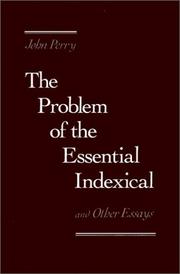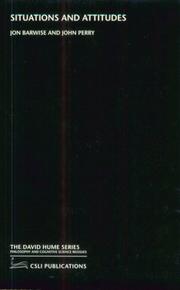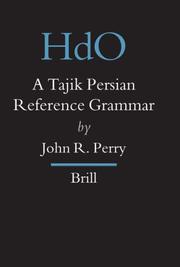| Listing 1 - 10 of 33 | << page >> |
Sort by
|

ISBN: 9780262661355 0262161990 0262661357 0262281414 1423726626 9780262281416 9780262161992 Year: 2001 Volume: 1999 Publisher: Cambridge, Mass. : MIT Press,
Abstract | Keywords | Export | Availability | Bookmark
 Loading...
Loading...Choose an application
- Reference Manager
- EndNote
- RefWorks (Direct export to RefWorks)
Physicalism is the idea that if everything that goes on in the universe is physical, our consciousness and feelings must also be physical. Ever since Descartes formulated the mind-body problem, a long line of philosophers has found the physicalist view to be preposterous. According to John Perry, the history of the mind-body problem is, in part, the slow victory of physical monism over various forms of dualism. Each new version of dualism claims that surely something more is going on with us than the merely physical.In this book Perry defends a view that he calls antecedent physicalism. He takes on each of three major arguments against physicalism, showing that they pose no threat to antecedent physicalism. These arguments are the zombie argument (that there is a possible world inhabited by beings that are physically indiscernible from us but not conscious), the knowledge argument (that we can know facts about our own feelings that are not just physical facts, thereby proving physicalism false), and the modal argument (that the identity of sensation and brain state is contingent, but since there is no such thing as contingent identity, sensations are not brain states).
Theory of knowledge --- Knowledge, Theory of --- Philosophy of mind --- Consciousness --- Philosophy --- Philosophy & Religion --- Speculative Philosophy --- Epistemology --- Psychology --- Materialism --- Knowledge, Theory of. --- COGNITIVE SCIENCES/General --- PHILOSOPHY/Philosophy of Mind/General

ISBN: 0195049993 Year: 1993 Publisher: Oxford Oxford University Press
Abstract | Keywords | Export | Availability | Bookmark
 Loading...
Loading...Choose an application
- Reference Manager
- EndNote
- RefWorks (Direct export to RefWorks)
Belief and doubt. --- Meaning (Philosophy). --- Signification (philosophie) --- Doute --- Meaning (Philosophy) --- Philosophy of language --- Belief and doubt --- Philosophy --- Semantics (Philosophy) --- Conviction --- Doubt --- Consciousness --- Credulity --- Emotions --- Knowledge, Theory of --- Psychology --- Religion --- Will --- Agnosticism --- Rationalism --- Skepticism --- Doute.
Book
ISBN: 1107721164 1107723442 1107728142 1107728746 1107730503 1107724139 1107732255 1107279623 1107050758 1107696577 Year: 2014 Publisher: Cambridge : Cambridge University Press,
Abstract | Keywords | Export | Availability | Bookmark
 Loading...
Loading...Choose an application
- Reference Manager
- EndNote
- RefWorks (Direct export to RefWorks)
Is ethics about happiness? Aristotle thought so and for centuries Christians agreed, until utilitarianism raised worries about where this would lead. In this volume, Peter Singer, leading utilitarian philosopher and controversial defender of infanticide and euthanasia, addresses this question in conversation with Christian ethicists and secular utilitarians. Their engagement reveals surprising points of agreement and difference on questions of moral theory, the history of ethics, and current issues such as climate change, abortion, poverty and animal rights. The volume explores the advantages and pitfalls of basing morality on happiness; if ethics is teleological, is its proper aim the subjective satisfaction of preferences? Or is human flourishing found in objective goods: friendship, intellectual curiosity, meaningful labour? This volume provides a timely review of how utilitarians and Christians conceive of the good, and will be of great interest to those studying religious ethics, philosophy of religion and applied ethics.
Utilitarianism. --- Good and evil. --- Christian ethics. --- Ethical theology --- Moral theology --- Theology, Ethical --- Theology, Moral --- Christian life --- Christian philosophy --- Religious ethics --- Evil --- Wickedness --- Ethics --- Philosophy --- Polarity --- Religious thought --- Hedonism --- Singer, Peter, --- Singer, Peter Albert David
Book
Year: 1954 Publisher: New York (N.Y.) : McGraw-Hill,
Abstract | Keywords | Export | Availability | Bookmark
 Loading...
Loading...Choose an application
- Reference Manager
- EndNote
- RefWorks (Direct export to RefWorks)
Book
Year: 1897 Publisher: London : Arnold,
Abstract | Keywords | Export | Availability | Bookmark
 Loading...
Loading...Choose an application
- Reference Manager
- EndNote
- RefWorks (Direct export to RefWorks)
Book
Year: 1897 Publisher: London : E. Arnold.
Abstract | Keywords | Export | Availability | Bookmark
 Loading...
Loading...Choose an application
- Reference Manager
- EndNote
- RefWorks (Direct export to RefWorks)

ISBN: 1575861933 Year: 1999 Volume: *1 Publisher: Stanford, Calif. CSLI Publications
Abstract | Keywords | Export | Availability | Bookmark
 Loading...
Loading...Choose an application
- Reference Manager
- EndNote
- RefWorks (Direct export to RefWorks)
Philosophy of language --- Semantics (Philosophy) --- Semantiek (Filosofie) --- Sémantique (Philosophie) --- Semantics (Philosophy).
Multi
ISBN: 9780521764971 9780521748674 0521748674 9780511994869 9781139100663 1139100661 9781139101325 1139101323 0511994869 1283306956 9781283306959 1139099302 9781139099301 0521764971 9781139099301 1107217326 9781107217324 1139103121 9781139103121 9786613306951 6613306959 1139098632 9781139098632 Year: 2011 Publisher: Cambridge : Cambridge University Press,
Abstract | Keywords | Export | Availability | Bookmark
 Loading...
Loading...Choose an application
- Reference Manager
- EndNote
- RefWorks (Direct export to RefWorks)
Critical Pragmatics develops three ideas: language is a way of doing things with words; meanings of phrases and contents of utterances derive ultimately from human intentions; and language combines with other factors to allow humans to achieve communicative goals. In this book, Kepa Korta and John Perry explain why critical pragmatics provides a coherent picture of how parts of language study fit together within the broader picture of human thought and action. They focus on issues about singular reference, that is, talk about particular things, places or people, which have played a central role in the philosophy of language for more than a century. They argue that attention to the 'reflexive' or 'utterance-bound' contents of utterances sheds new light on these old problems. Their important study proposes a new approach to pragmatics and should be of wide interest to philosophers of language and linguists.
Lexicology. Semantics --- Philosophy of language --- Pragmatics --- Communication. --- Language and languages --- Pragmatics. --- Reference (Linguistics) --- Semantics. --- Philosophy. --- Reference (Linguistics). --- Signification (Linguistics) --- Linguistics --- Onomasiology --- Semantics --- Communication, Primitive --- Mass communication --- Sociology --- Formal semantics --- Semasiology --- Semiology (Semantics) --- Comparative linguistics --- Information theory --- Lexicology --- Meaning (Psychology) --- Arts and Humanities --- Philosophy

ISBN: 9004143238 9047414918 Year: 2005 Volume: 11 Publisher: Leiden Boston Brill
Abstract | Keywords | Export | Availability | Bookmark
 Loading...
Loading...Choose an application
- Reference Manager
- EndNote
- RefWorks (Direct export to RefWorks)
Tajik language --- Tadjik (Langue) --- Grammar. --- Grammaire
Book
ISBN: 0262021897 9780262021890 Year: 1984 Publisher: Cambridge (Mass.): MIT Press,
Abstract | Keywords | Export | Availability | Bookmark
 Loading...
Loading...Choose an application
- Reference Manager
- EndNote
- RefWorks (Direct export to RefWorks)
Semantics (Philosophy) --- Intension (Philosophy) --- Logical semantics --- Semantics (Logic) --- Semeiotics --- Significs --- Syntactics --- Unified science --- Language and languages --- Logic, Symbolic and mathematical --- Logical positivism --- Meaning (Psychology) --- Philosophy, Modern --- Semiotics --- Signs and symbols --- Symbolism --- Analysis (Philosophy) --- Definition (Philosophy) --- Semantics (Philosophy). --- 800.1 --- 800.1 Taalfilosofie --- Taalfilosofie --- Logic --- Lexicology. Semantics --- Philosophy of language --- Sémantique (Philosophie)
| Listing 1 - 10 of 33 | << page >> |
Sort by
|

 Search
Search Feedback
Feedback About UniCat
About UniCat  Help
Help News
News